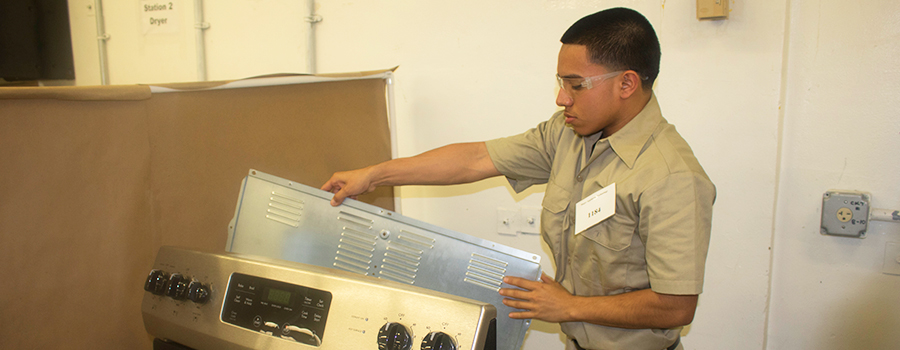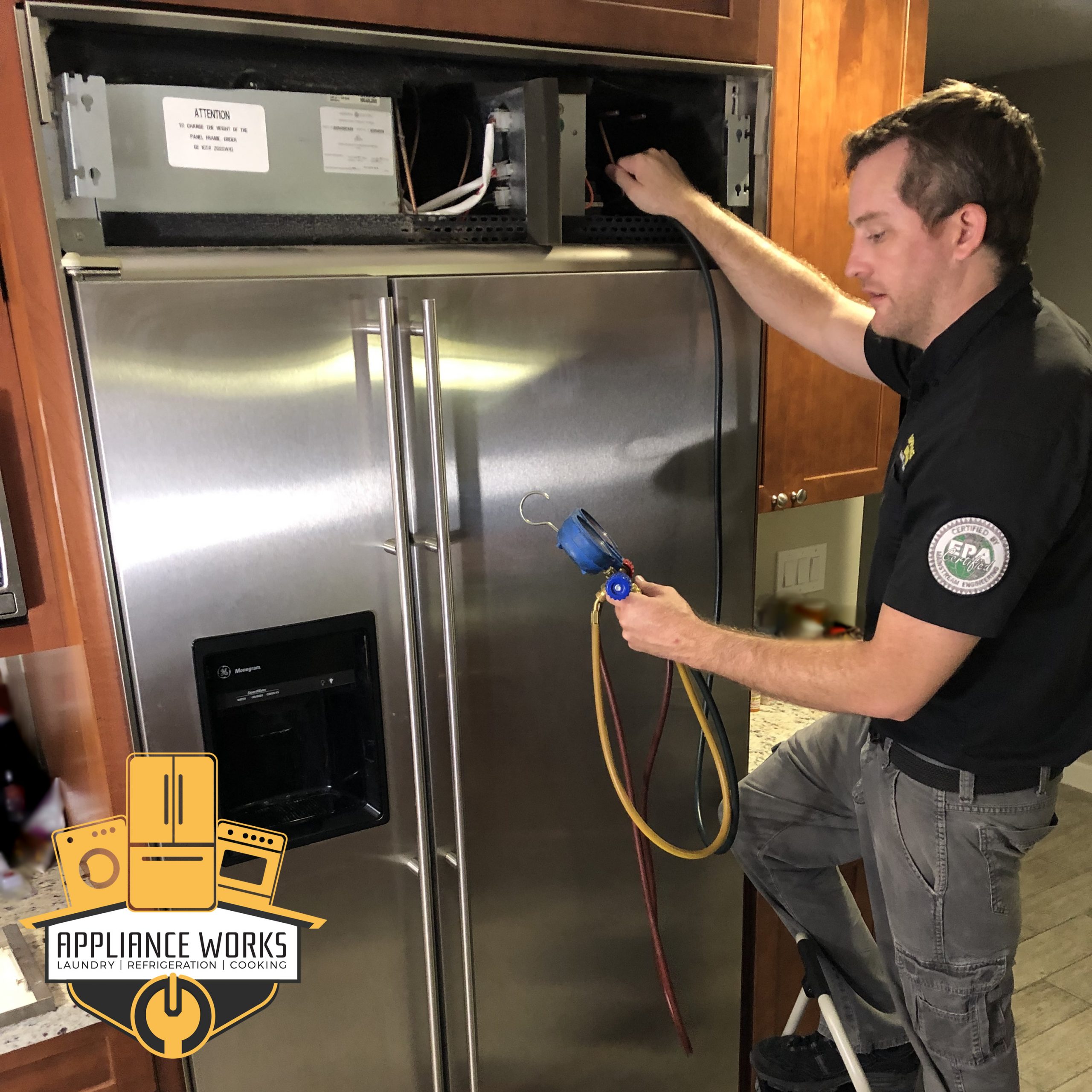Necessary Tips for Effective Ref Repair Work to Prolong Appliance Lifespan
When it comes to your refrigerator, proper fixing and upkeep are vital for durability. Comprehending usual issues and understanding when to act can make all the difference.
Understanding Usual Refrigerator Issues
Fridges are vital in keeping your food fresh, but they can come across a series of typical problems that disrupt their performance. One frequent issue is insufficient cooling. If you see food ruining quicker than typical, check the thermostat setups or consider if the door seals are harmed. Another usual trouble is too much noise, which can show a malfunctioning compressor or a stopping working fan. You may likewise experience water merging inside or beneath the refrigerator; this commonly arises from a blocked defrost drain or a defective water line. In addition, if your refrigerator's light isn't functioning, it can be an easy light bulb issue or a problem with the door button. Lastly, ice build-up in the freezer can prevent air flow and cooling efficiency. Recognizing these issues early can save you time and money out of commission, guaranteeing your fridge runs efficiently and successfully.
Normal Maintenance Practices
To keep your devices running smoothly, you need to stay on top of routine maintenance methods. Tidy the condenser coils, examine the door seals, and check the temperature level settings to assure peak performance. These easy jobs can save you money and time on repair services down the line.
Tidy Condenser Coils On A Regular Basis
Cleansing your condenser coils consistently can significantly improve your home appliance's efficiency. Dust and dust develop up on these coils over time, creating your appliance to work harder and eat more energy. To keep them clean, disconnect your device and carefully eliminate any type of safety covers.
Inspect Door Seals
Three simple steps can help you ensure your device's door seals are in excellent problem. 2nd, clean the seals using cozy, soapy water to remove any kind of particles or gunk. By complying with these steps, you'll maintain your home appliance's efficiency and longevity, conserving you money on energy expenses and repair work in the long run.
Display Temperature Level Setups
Routinely checking your home appliance's temperature setups is essential for ideal efficiency and performance. Whether you're dealing with a refrigerator, fridge freezer, or stove, keeping an eye on these settings can prevent numerous concerns. For refrigerators, go for temperatures in between 35 ° F and 38 ° F; for freezers, linger 0 ° F. If the temperatures are expensive or reduced, your appliance may work harder, losing energy and shortening its life expectancy. Make use of a thermostat to check these settings consistently, specifically after major adjustments, like moving your appliance or readjusting the thermostat. If you observe variations, change the settings appropriately and speak with the customer manual for support. By remaining positive regarding temperature tracking, you'll ensure your home appliances run smoothly and last much longer.
Repairing Cooling Problems
When your fridge isn't cooling correctly, it can cause spoiled food and wasted money, so dealing with the concern without delay is vital. Beginning by inspecting the temperature settings to verify they go to the suggested degrees, usually around 37 ° F for the refrigerator and 0 ° F for the freezer. If the setups are right, check the door seals for any kind of voids or damage; a malfunctioning seal can enable warm air to get in.
Following, analyze the vents inside the refrigerator and freezer. Validate they're not obstructed by food items, as this can interfere with airflow. Listen for the compressor; if it's not running or making uncommon sounds, it may require interest. Ultimately, inspect the condenser coils, typically situated at the back or bottom of the device. Dust and debris can build up, causing cooling issues. Tidy them with a vacuum cleaner or brush to enhance performance. If issues continue, it could be time to call an expert.
Dealing With Water Leakage and Ice Build-Up
If you're dealing with water leak or ice accumulation in your home appliance, it's important to recognize the resource of the issue. By determining where the water is coming from, you can stop further issues and stay clear of expensive repair services. Let's discover some effective techniques to tackle these typical issues.
Recognize Leakage Resources
Just how can you effectively identify the sources of water leakage and ice accumulation in your home appliances? Beginning by evaluating the seals and gaskets on your refrigerator and fridge freezer doors. By systematically checking these visit our website areas, you'll identify the source of the problem, permitting you to take the needed steps to fix it and prolong your device's life-span.
Prevent Ice Formation
To avoid ice development in your devices, begin by validating the temperature level setups are proper. If your refrigerator or fridge freezer is too chilly, it can lead to excessive ice accumulation. Examine the door seals on a regular basis; harmed seals can let warm air in, causing condensation and ice development.
Maintain the appliance well-ventilated and prevent congestion, as this can block air flow - Appliance visit their website Repair Oro Valley Dependable Appliance Services. Also, consistently thaw your fridge freezer if it does not have an automated defrost attribute.
If you discover water leakage, identify and take care of any type of obstructed drainage openings, as they can add to ice buildup. Clean the coils and confirm they're operating effectively to preserve peak performance. Taking these actions will certainly assist extend your home appliance's lifespan and efficiency.
Dealing With Noisy Fridge Seems
While it might seem startling, a noisy refrigerator usually signals minor concerns instead of major breakdowns. Recognize the source of the sound. Typical culprits consist of the compressor, followers, and water lines. If you hear a buzzing audio, it may be the compressor working hard; this can just be a normal operation noise.
Following, look for loosened items inside. Sometimes, containers or shelves can rattle, producing unwanted sound. Tighten up or reorganize them to get rid of the noises.
If you see a clicking sound, it could be the defrost timer. This is typically harmless however can indicate it needs inspection.
Ultimately, verify your fridge is degree. An unbalanced appliance can generate resonances and noise. Utilize a level to examine, and adjust the feet if needed. Resolving these concerns immediately can assist maintain your refrigerator's performance and extend its lifespan.
When to Replace Components vs. Full Substitute

Nonetheless, if your device is older and experiencing numerous concerns, a complete substitute can be more affordable. Take into consideration the cost of fixings versus the appliance's worth. If repairs exceed 50% of a new unit's cost, it's typically smarter to invest in a substitute. Furthermore, if you observe recurring troubles that maintain repeating, it's a sign that your device has reached completion of its life. Consider these factors meticulously to make the very best decision for your requirements and budget plan.
Knowing When to Call a Specialist
Just how can you inform when it's time to contact a professional for device repair work? If you notice unusual noises, scents, or leakages, it's a clear signal that something's incorrect. Don't disregard these indications; they usually suggest deeper issues. If your appliance quits working entirely or often trips breaker, it's another warning.
You ought to likewise consider your very own convenience degree with repair services. If you're not sure concerning diagnosing the trouble or do not have the right tools, it's ideal to get to out for aid. Keep in mind, trying challenging repairs can bring about more damage and even safety dangers.

Often Asked Questions
Just how Often Should I Tidy the Refrigerator Coils?
You need to clean your refrigerator coils every six months. This aids keep performance and stops getting too hot. If you observe excessive dust or pet hair, clean them much more regularly to ensure your fridge runs smoothly.

Can I Use Vinegar for Cleaning My Refrigerator?
Yes, you can utilize vinegar to cleanse your fridge! It's an outstanding all-natural cleanser that removes smells and discolorations. GE appliance repair Oro Valley Dependable Refrigeration & Appliance Repair Service. Simply blend it with water, use it to surfaces, and wipe down for a fresh, tidy fridge
What Temperature Should My Refrigerator Be Establish To?
You should set your fridge to 37 ° F(3 ° C) for perfect food conservation. This temperature keeps your food fresh while stopping putridity, guaranteeing your grocery stores last much longer and lowering waste. It's a very easy change you can make!
Does a Fridge Required to Be Leveled?
Yes, your refrigerator needs to be leveled. If it's uneven, it can impact cooling down performance and trigger excess sound. Examine the progressing legs and readjust them to ensure appropriate balance for suitable efficiency.
Exactly How Can I Lower Fridge Power Intake?
To minimize your fridge's power usage, keep it tidy and well-ventilated, inspect door seals for leakages, set the temperature level in between 35-38 ° F, and Our site stay clear of overwhelming it. These actions can considerably reduce your energy costs.